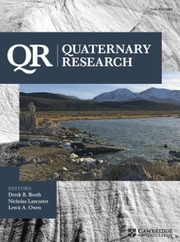Crossref Citations
This article has been cited by the following publications. This list is generated based on data provided by
Crossref.
Klein, Richard G.
1991.
Size variation in the Cape dune molerat (Bathyergus suillus) and late Quaternary climatic change in the southwestern Cape Province, South Africa.
Quaternary Research,
Vol. 36,
Issue. 3,
p.
243.
Klein, Richard G.
and
Cruz-Uribe, Kathryn
1996.
Size Variation in the Rock Hyrax (Procavia capensis) and Late Quaternary Climatic Change in South Africa.
Quaternary Research,
Vol. 46,
Issue. 2,
p.
193.
Hadly, Elizabeth A.
1997.
Evolutionary and ecological response of pocket gophers (Thomomys talpoides) to late-Holocene climatic change.
Biological Journal of the Linnean Society,
Vol. 60,
Issue. 2,
p.
277.
Wolverton, Steve
and
Lyman, R.Lee
1998.
Measuring Late Quaternary Ursid Diminution in the Midwest.
Quaternary Research,
Vol. 49,
Issue. 3,
p.
322.
Meiri, Shai
and
Dayan, Tamar
2003.
On the validity of Bergmann's rule.
Journal of Biogeography,
Vol. 30,
Issue. 3,
p.
331.
Byers, David A.
and
Broughton, Jack M.
2004.
Holocene Environmental Change, Artiodactyl Abundances, and Human Hunting Strategies in the Great Basin.
American Antiquity,
Vol. 69,
Issue. 2,
p.
235.
Yerkes, Richard W.
2005.
Bone Chemistry, Body Parts, and Growth Marks: Evaluating Ohio Hopewell and Cahokia Mississippian Seasonality, Subsistence, Ritual, and Feasting.
American Antiquity,
Vol. 70,
Issue. 2,
p.
241.
Wolverton, Steve
2005.
The Effects of the Hypsithermal on Prehistoric Foraging Efficiency in Missouri.
American Antiquity,
Vol. 70,
Issue. 1,
p.
91.
Eda, Masaki
Baba, Yoshiyuki
Koike, Hiroko
and
Higuchi, Hiroyoshi
2006.
Do temporal size differences influence species identification of archaeological albatross remains when using modern reference samples?.
Journal of Archaeological Science,
Vol. 33,
Issue. 3,
p.
349.
Wheatley, Patrick V.
and
Ruez, Dennis R.
2006.
PlioceneOdocoileusfrom Hagerman Fossil Beds National Monument, Idaho, and comments on the taxonomic status ofOdocoileus brachyodontus.
Journal of Vertebrate Paleontology,
Vol. 26,
Issue. 2,
p.
462.
Wolverton, Steve
Kennedy, James H.
and
Cornelius, John D.
2007.
A Paleozoological Perspective on White-Tailed Deer (Odocoileus virginianus texana) Population Density and Body Size in Central Texas.
Environmental Management,
Vol. 39,
Issue. 4,
p.
545.
Wolverton, Steve
2008.
Harvest Pressure and Environmental Carrying Capacity: An Ordinal-Scale Model of Effects on Ungulate Prey.
American Antiquity,
Vol. 73,
Issue. 2,
p.
179.
Broughton, Jack M.
Byers, David A.
Bryson, Reid A.
Eckerle, William
and
Madsen, David B.
2008.
Did climatic seasonality control late Quaternary artiodactyl densities in western North America?.
Quaternary Science Reviews,
Vol. 27,
Issue. 19-20,
p.
1916.
Hill, Matthew E.
Hill, Matthew G.
and
Widga, Christopher C.
2008.
Late Quaternary Bison diminution on the Great Plains of North America: evaluating the role of human hunting versus climate change.
Quaternary Science Reviews,
Vol. 27,
Issue. 17-18,
p.
1752.
Lyman, R. Lee
and
VanPool, Todd L.
2009.
Metric Data in Archaeology: A Study of Intra-Analyst and Inter-Analyst Variation.
American Antiquity,
Vol. 74,
Issue. 3,
p.
485.
Wolverton, Steve
Lyman, R Lee
Kennedy, James H
and
La Point, Thomas W
2009.
The Terminal Pleistocene Extinctions in North America, Hypermorphic Evolution, and the Dynamic Equilibrium Model.
Journal of Ethnobiology,
Vol. 29,
Issue. 1,
p.
28.
Wolverton, Steve
Huston, Michael A
Kennedy, James H
Cagle, Kevin
and
Cornelius, John D
2009.
Conformation to Bergmann's Rule in White-tailed Deer can be Explained by Food Availability.
The American Midland Naturalist,
Vol. 162,
Issue. 2,
p.
403.
Fisher, Timothy
and
Lyman, R. Lee
2010.
Taphonomy, pathology, and paleoecology of the terminal Pleistocene Marmes Rockshelter (45FR50) “big elk” (Cervus elaphus), southeastern Washington State, USA.
Canadian Journal of Earth Sciences,
Vol. 47,
Issue. 11,
p.
1367.
Huston, Michael A.
and
Wolverton, Steve
2011.
Regulation of animal size by eNPP, Bergmann's rule, and related phenomena.
Ecological Monographs,
Vol. 81,
Issue. 3,
p.
349.
Lyman, R. Lee
2012.
Paleontology in Ecology and Conservation.
p.
147.


